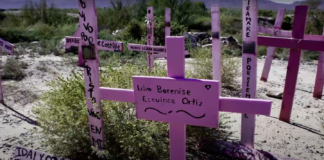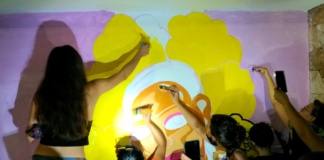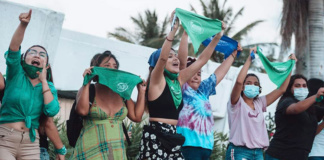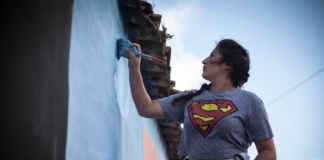Mexico’s double pandemic
For over a year, Mexico has been battling the COVID-19 health emergency but another worrying, silent pandemic is currently unfolding. Violence against women, including femicides, has increased exponentially.
Artists and activists change the narrative around femicide
Open call launches to support feminist artists and activists change the narrative on femicide in the UK and Mexico
Police brutally killed Victoria Salazar: how are feminists representing her death...
On 27 March 2021, the Mexican police brutally killed Victoria Salazar, a refugee who had fled violence in El Salvador. Feminist activists in Tulum are using the visual arts to honour and remember her.
Quintana Roo sit-in marks historic step towards legalisation of abortion in...
The Quintana Roo Feminist Network’s 94-day sit-in at the State Congress recently came to an end, after legislators agreed to hold a vote on the legalisation of abortion. Although that vote was lost, the decision will allow the movement to take the fight to the Supreme Court.
International Women’s Day celebrations across Latin America
On International Women’s Day this past Monday 8 March, 2021, women and their allies throughout the region took to the streets to protest against discrimination, inequality and violence against women and girls. Here is how the day was celebrated across the region.
How did Mexico City mark International Women’s Day 2021?
In the run-up to International Women’s Day in Mexico City and in spite of the pandemic that is sweeping the country, the women’s movement planned a demonstration to demand a life free from violence.
Beyond the Campus: rethinking research engagement and impact
LAB offers a range of services to improve the impact and engagement of university research. A new brochure and a public talk at the SLAS Virtual Conference outlines what LAB can offer and why this area of work needs a refresh.
Resisting and transforming intersectional gendered violence
LAB council members and academics at King’s College are embarking on a new project to explore and celebrate grassroots campaigns and organisations that counter violence against women and girls in Latin America -- through a podcast series, website, workshop and book.
Argentina: the hidden crime of obstetric violence
Women in Argentina have recently celebrated progress in women’s reproductive rights with the historic vote in the Senate approving the legalisation of abortion but other struggles for women’s rights to control their own bodies continue.









